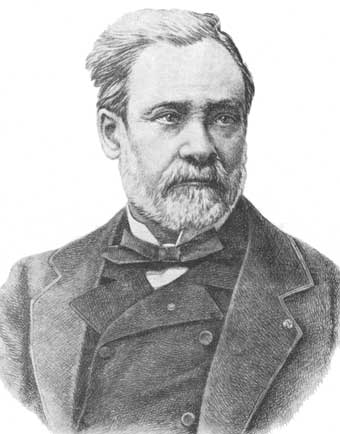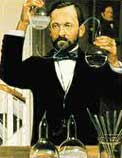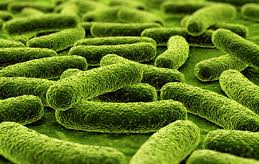Louis Pasteur was a French chemist and microbiologist. He is known and remembered for hisextraordinary advances and discoveries in disease prevention.
Pasteur is most notoriously known for his invention of the pasteurization process, basically a way to avoid wine and milk from provoking sickness.
He is considered one of the founding fathers of microbiology and proved that the vast majority of infectious diseases are caused by micro-organisms. This became known as the "germ theory" of disease.

This remarkable man was born into rather unremarkable circumstances in 1822 to a poor tanner family in Dole, a town in the Jura region of France. He grew up in the nearby town of Arbois and although he was a conscientious student, he was by no means exceptional.
Nevertheless he was encouraged to pursue his studies and he gained degrees in Letters and in Mathematical Sciences before entering the École Normale Supérieure, an elite college in Paris.
In 1847 he was awarded a doctorate and then was hired by one of his teachers to be his assistant. After briefly working as a professor of physics at Dijon Lycée in 1848, he moved to the University of Strasbourgand became a chemistry professor. There he met the rector's daughter, Marie Laurent, and Louis and Marie got married in May 1849.
Together they had five children, but it seems that Pasteur's personal life was not as charmed as his professional life as only two of their children survived to adulthood. The other three died of typhoid which motivated Pasteur to dedicate his life to finding cures for diseases such as typhoid.
At first glance Louis Pasteur's list of achievements might seem like a widely diverse mix, but on closer inspection of his career there was a logic to his discoveries. Pasteur's brilliance came from his ability to review all the known data, connecting it with hypothesis and then the discipline and patience to carry out experiments under strictly controlled conditions.

While this might seem to be common sense, Pasteur was really a pioneer of this approach to science.
In 1854, Pasteur was appointed professor of chemistry at the University of Lille. The faculty had been established in par to find solutions to the practical problems of some of the region's industries, more specifically the manufacture of alcoholic drinks.
At Strasbourg Louis Pasteur had been interested in the fermentation process and he was able to identify the changes in beer or wine by fermentation, when milk sours or when meat decays were produced when some micro-organisms were present.
As a result of this study, Pasteur was requested to work with local breweries in order to solve a problem that has become a major economic concern in France, which was beer turning bad. He identified a bacteria that was present in the bad beer but not the good beer which was an important discovery.
Continued experimentation revealed that the harmful bacteria could be removed by boiling and then cooling the liquid.
Pasteur extended his method to other problems such as the souring of milk and it was a success. This process is now called pasteurization.
By 1857 Pasteur was an internationally renowned scientist and in 1865 he was invited to become the director of scientific studies at the École Normale in Paris.
At this time the silk industry in southern France was suffering an epidemic among the silk worms and was on the brink of collapse. Pasteur was asked to help and through his observations he discovered that the diseased worms and eggs contained tiny organisms that were not present in the healthy worms.
By experimenting with healthy worms, Pasteur identified that the disease was connected to the bacteria - a link that had never been made before. He devised a simple way of keeping silk worms in healthy and to avoid getting them infected with the disease, so not only was the silk industry saved but there had been a major scientific breakthrough.

His many investigations persuaded Pasteur that his germ theory was accurate, this simple hypothesis says that the germs attack the body from outside. At that time many scientists thought that such infinitesimal organisms surely would not be able to kill organisms that were so much larger.
Louis Pasteur continued down this path of study, first applying it to the problem of anthrax in cattle.
Through a series of experiments, Pasteur discovered that cows that had already suffered from anthrax were not susceptible to the disease a second time. Overtime he developed a weakened and harmless culture of anthrax bacteria which he injected into cattle and sheep. The animals recovered and remained unaffected by other beasts with the disease.
In other words, they were immune.
It was the first time in the history of the world that anyone had discovered the method of vaccination.

Pasteur went on to extend this theory to explain the causes of many diseases - including cholera, TB and smallpox - and their prevention by vaccination. One of his best known work is the development of a vaccine for rabies. By studying the tissue of rabid animals Pasteur was able to produce a lesser form of the virus which could be used for inoculation.
He tested is cutting edge vaccination on a human for the first time in 1985, when he inoculated the virus into a young man that had been bitten by a rabid dog, successfully saving his life. Since then countless people have been saved by Pasteur's innovation.
In March 1886, Pasteur presented his findings to the Academy of Sciences and as a result he founded a special institute in Paris for the treatment of diseases in 1888.
This pioneering clinic continued the study of infectious diseases under Pasteur's strict direction until his death in September 1895 and is still one of the most important centers in the world.